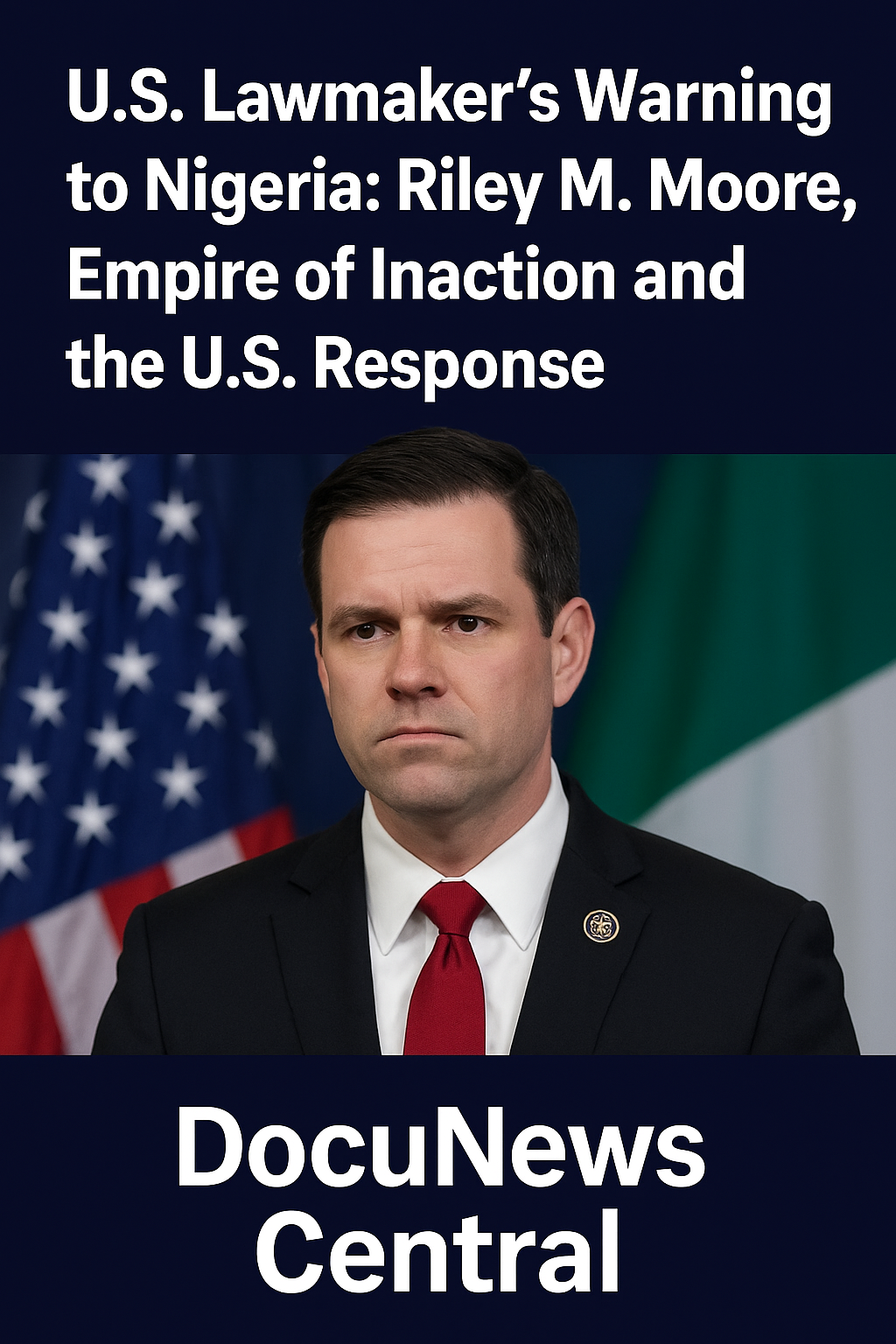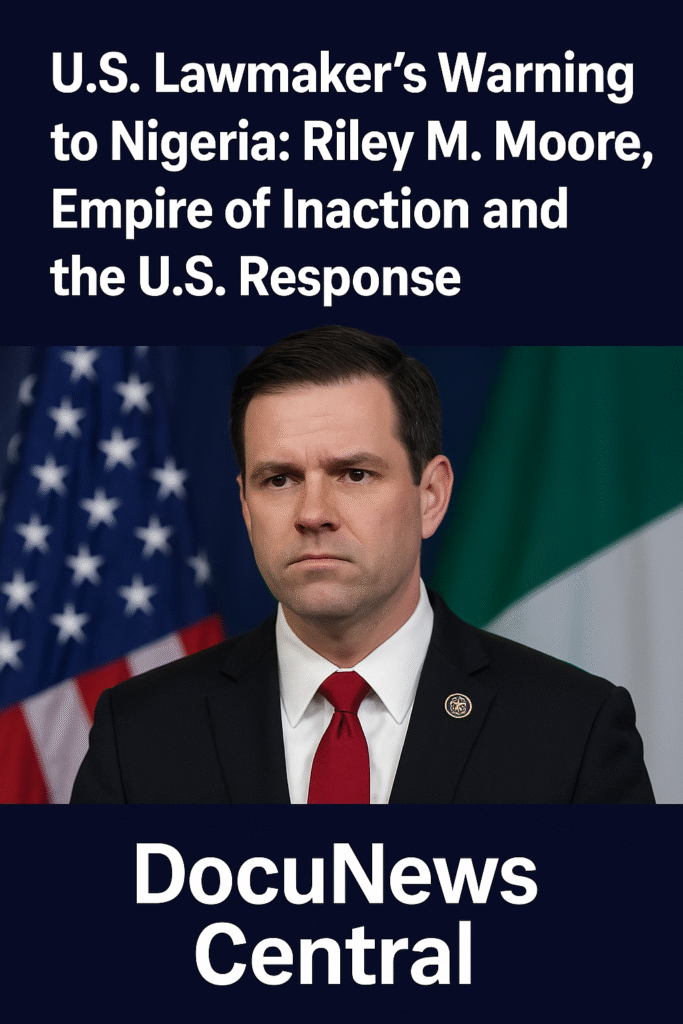

U.S. Lawmaker’s Warning to Nigeria: Riley M. Moore, Empire of Inaction and the U.S. Response
Subheading: Congressman Riley Moore urges swift action as Donald J. Trump designates Nigeria a “Country of Particular Concern” in the escalating Christian-persecution debate—what it means for President Bola Tinubu’s government and Nigeria’s standing.
Copyright reserved, DocuNews Central.

Nigeria’s Designation as a “Country of Particular Concern”
On October 31 2025, former U.S. President Donald J. Trump declared that Christianity in Nigeria “is facing an existential threat.” He announced Nigeria’s redesignation as a Country of Particular Concern (CPC) under the International Religious Freedom Act. This decision followed repeated pleas from U.S. lawmakers who argued that Nigeria has failed to stop attacks on Christians.
Trump’s announcement was supported by West Virginia Congressman Riley M. Moore, who described Nigeria as “the deadliest place in the world to be a Christian.” He urged swift U.S. intervention and demanded diplomatic accountability. These developments have made headlines across major outlets including Sahara Reporters and Gazette Nigeria.
What Moore and Others Are Urging
Representative Moore and his congressional allies are demanding strong U.S. action. They want Nigeria’s CPC status reinstated and military assistance suspended until its government demonstrates clear progress in protecting minorities. Moore’s letter to Secretary of State Marco Rubio emphasized that “the United States cannot stand idly by while believers are slaughtered.”
Moore’s tone was sharp and direct. Though the exact words attributed to him online cannot be verified verbatim, his consistent message is unmistakable—Nigeria’s leaders must correct the current state of inaction or face international consequences. His warning has amplified the moral and diplomatic pressure on President Tinubu.
Nigeria’s Response and the Complex Realities
The Nigerian government rejected the narrative that religious intolerance defines its society. According to Minister Mohammed Idris, such labels oversimplify a multifaceted security problem. Nigeria’s challenges—terrorism, banditry, and communal violence—affect both Muslims and Christians. Reports by Al Jazeera and The Independent UK confirm that the violence is rooted in political, economic, and ethnic tensions rather than religion alone.
Was the Warning Directed at President Tinubu?
Although no transcript directly quotes Moore addressing President Tinubu by name, analysts believe the warning was clearly meant for Nigeria’s leadership. By virtue of his office, Tinubu is accountable for implementing reforms to protect civilians and prevent further bloodshed. Trump’s endorsement of Moore’s campaign underscores that the U.S. is monitoring Nigeria’s response closely.
Implications for Nigeria, the U.S., and Christian-Muslim Relations
For Nigeria
The CPC designation can bring economic sanctions, aid restrictions, and reputational risk. Nigeria now faces international scrutiny and must demonstrate tangible security improvements. However, this also presents an opportunity to rebuild global trust by enforcing justice and strengthening community protection.
For the U.S.
Trump’s administration has re-positioned religious freedom as a foreign-policy priority. Lawmakers like Moore frame Nigeria’s crisis as both a humanitarian and political concern. Their stance will likely shape future U.S.–Africa relations and define moral expectations for aid and partnership.
For Christian-Muslim Relations in Nigeria
The “Christian genocide” label risks intensifying polarization. Many local analysts, including the Christian Association of Nigeria (CAN), caution that simplifying complex conflicts could inflame communal tensions. They urge the media to highlight how violence affects all citizens equally.
Key Takeaways
- Congressman Riley Moore has formally requested Nigeria’s redesignation as a CPC, citing thousands of Christian deaths in 2025.
- President Trump echoed this concern, appointing Moore and Tom Cole to lead a congressional review.
- The Nigerian government maintains that the violence is not driven solely by religion.
- The alleged “stern warning” attributed to Moore aligns with his established advocacy, though the precise quote is unconfirmed.
- The broader issue intertwines religious freedom, governance, and human security—demanding measured, factual discourse.
Final Thoughts
Through its investigative lens, DocuNews Central highlights that this story extends beyond one statement. It reflects the urgent need for balanced analysis and concrete action. Moore’s advocacy reveals how global politics, faith, and human rights overlap in today’s diplomacy.
Nigeria’s government can use this moment to reaffirm its commitment to protecting every citizen. Transparent investigations, fair law enforcement, and community dialogue are essential. Only by confronting the roots of violence—economic inequality, corruption, and weak institutions—can lasting peace emerge.
Meanwhile, the international community must approach Nigeria with respect and nuance. Blanket judgments or punitive measures may worsen instability. Constructive partnerships, not threats, offer the best path toward genuine reform.
Copyright © 2025 DocuNews Central. All rights reserved.
Internal links:
➤ FG Rejects US President Trump’s ‘Country of Concern’ Designation
➤ Nigerians Demand US Visa Bans for Tinubu and Others Over Corruption






